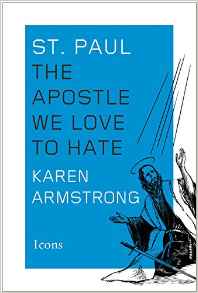 Karen Armstrong, St. Paul: The Apostle We Love to Hate (New York: New Harvest, 2015), 143pp.
Karen Armstrong, St. Paul: The Apostle We Love to Hate (New York: New Harvest, 2015), 143pp.
This slender volume is just one title in a series called "Icons" by the New Harvest imprint of the publisher Houghton Mifflin Harcourt. Other subjects in the series include Jesus (nice title: The Human Face of God), Alfred Hitchcock, Van Gogh, Edgard Allan Poe, David Lynch, Judy Garland, Hannah Arendt, etc. These books aren't substitutes for longer, critical studies, but they're still a good way to get a reliable overview of important culture makers.
The apostle Paul, observes Karen Armstrong, was "the first extant Christian author," writing about twenty years after the death of Jesus. He was also "the only intellectual in the [Jesus] movement," a statement she can make because she discounts Luke the physician as unreliable. In his own book What Paul Meant (2006), the historian Garry Wills calls Paul a "heroic traveler" who logged more than ten thousand miles spreading the love of God in Christ. No one shaped the Jesus movement, what eventually became Christianity, and therefore all the west, like Paul. So, it is entirely fitting for him to be included in the Icon series.
This is Armstrong's second book on Paul. In 1983 she published The First Christian, and, following the scholarly winds of the day, she says that she took it upon herself to show how much Paul had damaged Christianity and "ruined the original" message of Jesus. She loved to hate Paul, and to show how much he was "a misogynist, a supporter of slavery, a virulent authoritarian, and bitterly hostile to Jews and Judaism."
The scholarly winds have changed course in the last thirty years, and she now considers those early views as untenable. Today she loves Paul, because, as Wills put it, she believes that only later "impersonators and interpolators" turned Paul into a misogynist and anti-Semite. Undergirding her more recent interpretation of Paul are two critical presuppositions — that most everything that Luke writes about Paul is "nonsense, exaggeration, poetic creation, [and] fiction" (Wills), and that only seven of the epistles attributed to Paul are authentic.
Armstrong now understands Paul as a radical egalitarian, seen best in the Galatians 3:28 and Colossians 3:11 baptismal confession that in Christ "there is neither Jew nor Gentile, neither slave nor free, nor is there male and female, for you are all one in Christ Jesus." Paul also battled the "structural injustices" of Roman society. He "subverted imperial theology" in favor of an ekklesia founded upon mutual love. In addition, he negotiated the complex boundaries between his outreach to pagan Gentiles and fidelity to his Jewish background. In this regard there were both continuities and discontinuities.
Armstrong reminds us that we need to be careful about extrapolating from Paul's communities to our present day issues. He wasn't writing to us, but to local communities about specific matters two thousand years ago. But one thing we should take "very seriously," she says in the very last sentence of her book, and that is Paul's insistence that a life "in Christ" is a life "imbued with a love that is not a luxurious emotion in the heart but must be expressed daily and practically in self-emptying concern for others."


